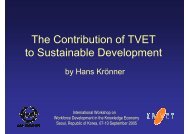Learning for Life, Work and the Future Initial ... - Unesco-Unevoc
Learning for Life, Work and the Future Initial ... - Unesco-Unevoc
Learning for Life, Work and the Future Initial ... - Unesco-Unevoc
You also want an ePaper? Increase the reach of your titles
YUMPU automatically turns print PDFs into web optimized ePapers that Google loves.
<strong>Learning</strong> <strong>for</strong> <strong>Life</strong>, <strong>Work</strong> <strong>and</strong> <strong>the</strong> <strong>Future</strong> Participants’ Papers Page 57<br />
(such as in-service trainees from industry) will also be<br />
catered <strong>for</strong>.<br />
This flexibility has allowed a considerable increase in<br />
<strong>the</strong> number of students entering TVET in Seychelles.<br />
More girls are now finding it easier to opt <strong>for</strong> a career<br />
in <strong>the</strong> construction <strong>and</strong> engineering industries through<br />
<strong>the</strong> new opportunities being offered to <strong>the</strong>m. The ITC<br />
has been able to double <strong>the</strong> intake figures <strong>for</strong> its<br />
courses, <strong>and</strong> is expected to absorb even more trainees<br />
once <strong>the</strong> construction of <strong>the</strong> new buildings with <strong>the</strong>ir<br />
additional facilities is complete.<br />
Training Programme Area<br />
Number by Gender<br />
Male Female Total<br />
Construction trades 250 14 264<br />
Engineering trades 275 11 286<br />
Student enrolment in 1999 <strong>and</strong> 2000 combined<br />
Modular structures require a diversified <strong>and</strong> flexible<br />
approach to <strong>the</strong> calendar <strong>and</strong> to daily timetables. The<br />
Centre will operate longer hours to accommodate <strong>the</strong><br />
various dem<strong>and</strong>s of full-time <strong>and</strong> in-service courses, as<br />
well as sufficient flexibility to accommodate trainees<br />
who need to remedy particular weaknesses.<br />
Trainees alternate between <strong>the</strong> ITC <strong>and</strong> industrial<br />
experience. When one-half of <strong>the</strong> trainees are in <strong>the</strong><br />
ITC, <strong>the</strong> o<strong>the</strong>r half is following industrial experience.<br />
However, although employers are now more willing to<br />
take on trainees <strong>for</strong> work-based experience, one drawback<br />
<strong>for</strong> <strong>the</strong> Seychelles is that <strong>the</strong>re are not enough<br />
placements on <strong>the</strong> isl<strong>and</strong>s <strong>for</strong> work-based experience.<br />
6. Certification<br />
The modular system will provide <strong>for</strong> a variety of types<br />
of certification. For example:<br />
• Completion (mastery) of a particular module/unit<br />
will automatically qualify <strong>the</strong> student <strong>for</strong> recognition<br />
of competence in that particular skill.<br />
• Completion (mastery) of a particular group of<br />
modules (<strong>and</strong> industrial experience) will qualify <strong>the</strong><br />
student <strong>for</strong> a particular certificate of competence at<br />
a particular level (Trades Test or its equivalent).<br />
• Completion of a particular range of modules may<br />
qualify <strong>the</strong> trainee to enter <strong>for</strong> an overseas examination.<br />
Modules are designed to cover very specific <strong>and</strong><br />
specialized needs of industry. Those following principally<br />
in-service courses, <strong>and</strong> who complete such<br />
modules, may qualify <strong>for</strong> recognition in that particular,<br />
specialized skill. In general, however, certification<br />
will be orientated to broader areas of competence.<br />
The Industrial Training Centre programmes are modular<br />
in nature <strong>and</strong> competency-based. This modular<br />
approach allows greater flexibility <strong>for</strong> trainees to opt<br />
<strong>for</strong> particular combinations to meet individual requirements.<br />
This will result in shorter training periods <strong>and</strong><br />
will allow trainees to move at <strong>the</strong>ir own pace.<br />
7. Areas <strong>for</strong> Co-operation<br />
With <strong>the</strong> help <strong>and</strong> assistance of o<strong>the</strong>rs, ITC could<br />
develop a unique learning system, personalized, <strong>and</strong><br />
self-paced. All programmes would be designed around<br />
practical projects that simulate actual working conditions.<br />
This approach to educational design <strong>and</strong><br />
management is more like <strong>the</strong> real world than <strong>the</strong><br />
traditional educational system. In <strong>the</strong>se programmes<br />
trainees will have <strong>the</strong> advantage of working one-to-one<br />
with instructors at a com<strong>for</strong>table pace. Classes would<br />
also be arranged to meet <strong>the</strong> requirements of part-time<br />
trainees.<br />
As <strong>the</strong> ITC is still at a developmental stage, <strong>the</strong>re are<br />
areas where <strong>the</strong> Centre could benefit from <strong>the</strong> assistance<br />
of o<strong>the</strong>r regional <strong>and</strong> international partners. In<br />
this day <strong>and</strong> age, co-operation <strong>and</strong> development are<br />
critical issues of TVET. The ITC would like to<br />
establish links with various training organizations <strong>and</strong><br />
providers within <strong>the</strong> subregion with a view to sharing<br />
resources <strong>and</strong> experience. This could be in <strong>the</strong> <strong>for</strong>m of<br />
exchange visits between staff <strong>and</strong> trainees, allowing<br />
ITC staff to be exposed to similar training approaches<br />
elsewhere. O<strong>the</strong>r areas could include programme<br />
development, staff training <strong>and</strong> resource development.<br />
13 LITABE, Mallane (Lesotho): Access to TVET<br />
1. Introduction<br />
Employment trends <strong>and</strong> work concepts are constantly<br />
changing worldwide. Employees are expected to work<br />
better, faster, <strong>and</strong> be more intelligent. Internationally,<br />
<strong>the</strong> traditional “work <strong>for</strong> life” concept is becoming a<br />
thing of <strong>the</strong> past. Due to <strong>the</strong> increasing emphasis on<br />
productivity, remuneration is based more <strong>and</strong> more on<br />
per<strong>for</strong>mance <strong>and</strong> production than on time. By <strong>the</strong><br />
same token, work of a higher quality is expected from<br />
fewer people in less time.<br />
This increasing value placed on per<strong>for</strong>mance emphasises<br />
how we use our time, <strong>and</strong> not how much of it we<br />
use. The end result could be an even greater scarcity<br />
of jobs. However, people who plan ahead, underst<strong>and</strong><br />
systems, <strong>and</strong> who can use technology to link learning<br />
with solutions, will always have plenty of work no<br />
matter how <strong>the</strong> future unfolds. This implies that





